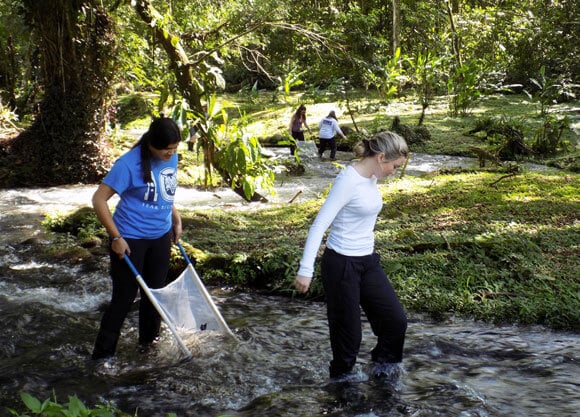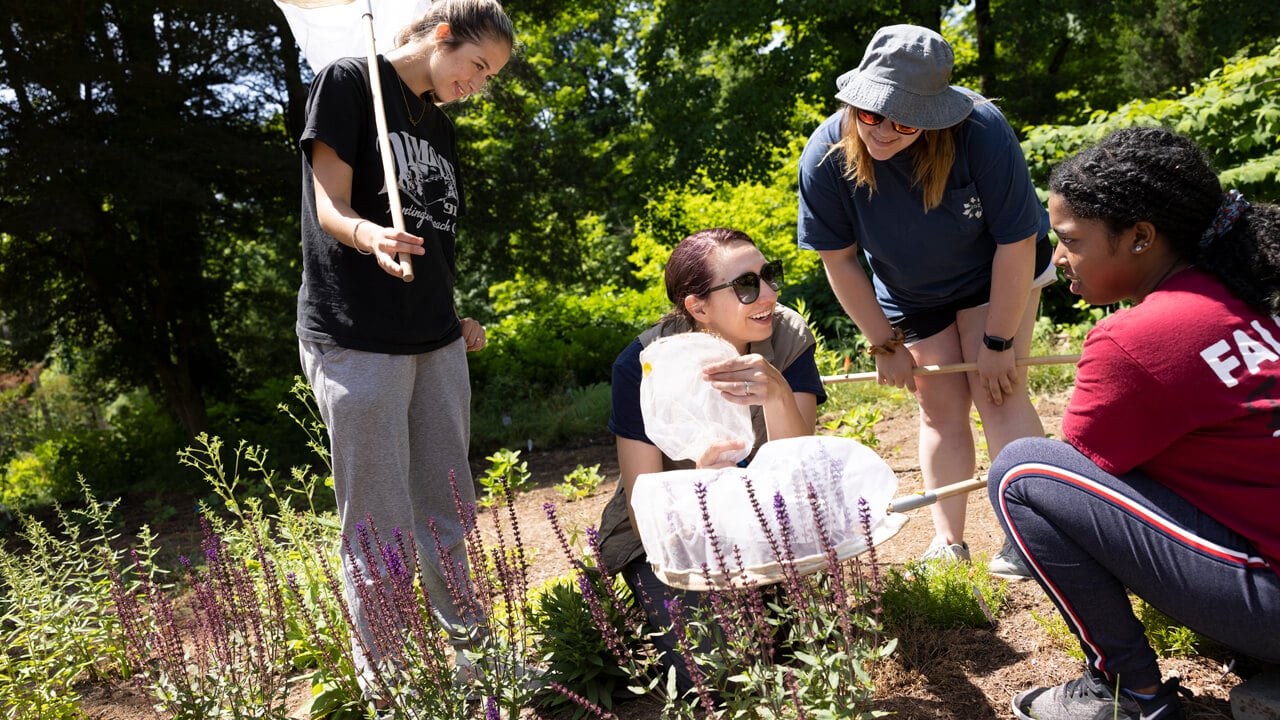
From remediating air, soil and water contamination to mitigating the effects of climate change, deforestation and wetland destruction, environmental scientists play a key role in protecting the planet and improving human health.


From remediating air, soil and water contamination to mitigating the effects of climate change, deforestation and wetland destruction, environmental scientists play a key role in protecting the planet and improving human health.

The BS in Environmental Science explores how the various biological, physical and information sciences intersect to shape the natural world, while examining the impact of humans on the environment from multiple perspectives, including political, legal, economic, cultural and sociological. You’ll use these lenses to analyze and interpret scientific data, conduct lab and field research, and examine solutions to many prevalent environmental issues.
Experiential learning is a major component of the program. Alongside experienced faculty, you might choose to conduct field research in climate change, limnology, renewable energy or bioremediation. You'll have an opportunity to pursue work with local nonprofits and governmental agencies or explore study abroad opportunities and faculty-led international courses.
Whether your main interest involves sustainability, agricultural production, environmental remediation or another specialty, this major provides the foundation for a range of careers. You may perform research on potential environmental health risks such as soil and water pollution or work to restore vital pollinators in the local community.

The garden contains eight themed beds hosting 200 varieties of native plants. Plants were chosen to bloom in succession for year-round growth, said Assistant Professor of Biology Sarah Lawson.
Riya Miller ’23, MS ’24, is taking advantage of the new garden for her QUIP-RS, an 8-week research project spanning the summer months. She designed her project to study the social hierarchy of the small carpenter bee, she said.
Ultimately, the pollinator bed will act as a blueprint for future sustainable planting around the Mount Carmel Campus, said Lawson.
Our BS in Environmental Science positions you for a growing number of specialized and in-demand opportunities. Graduates gain valuable skills suited for a wide array of potential careers, including:
Agricultural Science
Ecology
Environmental Education
Environmental Engineering
Environmental Health and Safety
Meteorology
Wildlife Education
Many of our graduates also choose to continue their education in post-secondary programs. Students have gone on to earn advanced degrees in data analytics, business administration, law and education.
With an abundance of career-focused information and resources, the career advisers within the College of Arts and Sciences support students as they expand their professional networks and attract the attention of prestigious employers.
Our Dual-Degree BA or BS/MAT programs allow you to gain the hands-on skills needed to thrive in an elementary, secondary or special education classroom. These programs enable you to seamlessly complete both your undergraduate and graduate studies in just five years. Our immersive, hands-on curriculum consists of classes, internships and student teaching experiences to shape you as a leader in education.
Dual-Degree BA or BS/MAT in Elementary Education (4+1)
We've partnered with the School of Business to design a dual-degree program that opens doors to new careers for individuals with an interest in making decisions related to environmental science, policy, sustainability, and stewardship. These programs make it easy to earn both your undergraduate and graduate studies in just five years, saving you time while preparing you to immediately make an impact as a manager and a leader in the environmental industry.
We've partnered with the School of Communications to design a dual-degree program that equips students with the knowledge and skills they need to cover, write and report on environmental policies, trends and issues. By earning both an undergraduate and graduate degree in just five years, you'll save time while expanding your skill set and increasing your value to prospective employers.
We envision a Quinnipiac that is a model for sustainability in southern New England, building its practices and leveraging its campuses to promote a healthy regional ecosystem, and to engage in practices that equip current and future students, faculty and staff to embody sustainable practices in their personal and professional lives, equipping them to thrive in a world increasingly influenced and affected by environmental disruption.
The Albert Schweitzer Institute conducts programs that link education, ethics and voluntarism for the sake of creating a more peaceful and sustainable world. A dynamic presence at Quinnipiac, the institute has drawn notable humanitarians both to campus and to its board, and gives students of all majors opportunities to make a positive impact on local and global communities.
The Department of Homeland Security has determined that this program meets the requirements for STEM designation.
STEM (science, technology, engineering and math) graduates are in high demand. According to the Bureau of Labor Statistics, there will be over 1.12 million jobs in STEM occupations in the next 10 years. The Department of Defense also estimates that more than 80% of jobs will require STEM skills over the next decade.
In addition, STEM-designated programs allow certain international graduates to remain and work in the United States for an additional 24 months after graduation on top of the standard Optional Practical Training period (up to 12 months) in order to receive additional training through their work experience.
Our undergraduate admissions counselors are here to answer any questions you may have and help you navigate the application process.